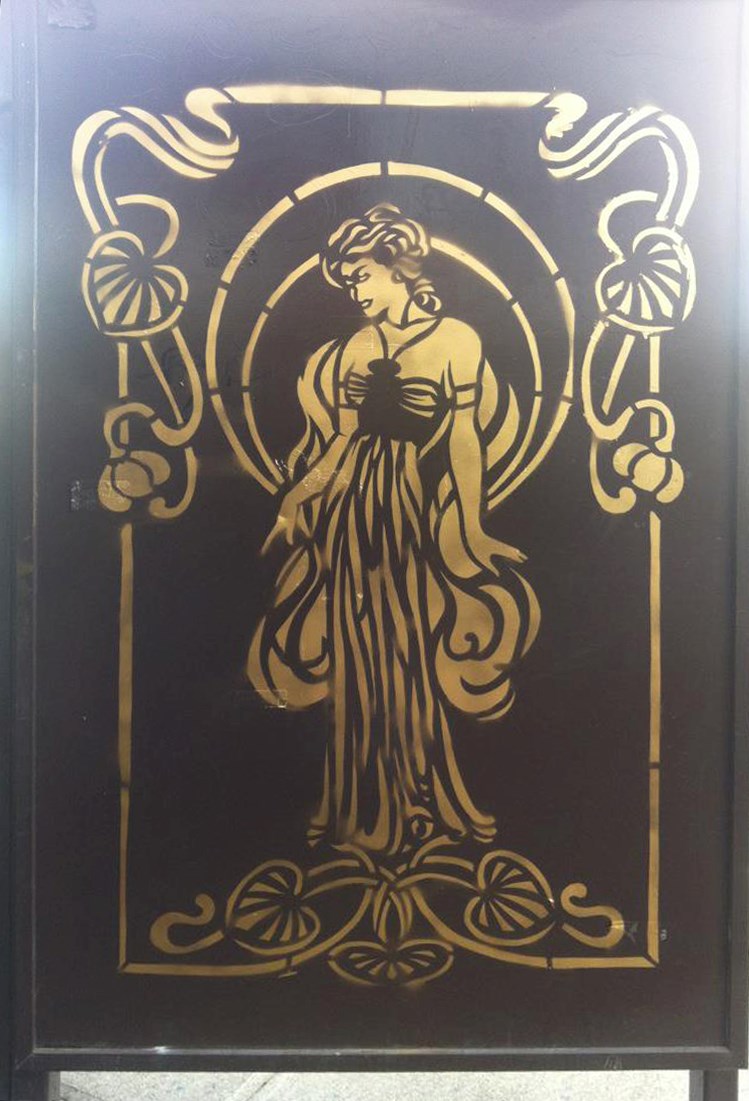There’s a covered bus stop that I pass every day on my way home from work. It’s on Fort Street, just past the turnoff to Craigdarroch Castle. On the brown siding of the bus stop, someone has spray-painted a picture of a woman with flowing hair and a full-length gown.
It’s a beautiful painting, stencilled vaguely in the style of Alphonse Mucha. The image is in good condition, though she’s been there for as long as I’ve been walking that way. The gold paint stands out dramatically against the darker background of the bus stop. With the falling cherry blossoms all around her, she looked like the personification of spring.
She’s no longer there. A few days ago, someone painted over what was technically graffiti on the bus stop. Ironically, the paint job intended to cover up the artwork is patchy at best; cheap brown paint, not quite the same shade as the bus stop, has been slapped ineffectively over the golden stencilling. The paler portions still show through.
The siding used to be a work of (albeit illegal) art, and now it’s just another ugly bus stop, patched up against the onslaught of graffiti and looking the worse because of it.
“Kind of a shame,” I thought to myself as I walked past. A shame that the people determined to stamp out graffiti couldn’t have made an exception for a work that clearly wasn’t doing anybody any harm, that was clearly intended to beautify, that actually did beautify — and a shame that it was replaced, in the name of obeying the letter of the law, with something ugly and crude.
But graffiti isn’t objectionable because it’s ugly; it’s often dynamic and colourful, actually. It’s objectionable because it interferes with how we’re encouraged to think about property and public space.
If you Google “Victoria graffiti,” you’ll run across the city’s anti-graffiti page, which sounds high-minded but undeniably WASPish as it denounces the dangers of decreasing property values. The rest of the top hits, on the other hand, are galleries devoted to recording and documenting West Coast graffiti as “momentary pockets of expression doomed to be painted over the next morning.”
The Internet, at least, is firmly in the camp of graffiti-as-art-form — and it’s a popular opinion in Victoria, especially since the majority of our street art isn’t gang-affiliated.
Now, it’s all well and good for me to have a moment of graffiti sympathy after my favourite painting was callously smeared over, but I don’t own property. I’ve never been a victim of graffiti. Although I live downtown, graffiti doesn’t bring down the value of my block. I’ve never lived in a neighbourhood where its presence indicates that my area is less safe, less valuable, less enviable than other areas. I acknowledge that I’ve never dealt with the downsides of graffiti.
Still, many street artists would argue that they’re not attempting to harm, but to beautify or even just engage with public space. For many opponents, it’s not why the graffiti is there, but simply that it’s there. Someone has had the audacity to say this space belongs to them, too. Our society privileges ownership and property, and graffiti challenges that. Not deeply, perhaps, but visibly.
I think it’s interesting that we’re keen to paint over illegal street art — are firmly convinced that it’s the correct thing to do (and I’m not saying it’s not) — yet have much more tolerance for larger-scale instances of public disfigurement.
I’m thinking mouldering car parks and neglected lots, but since neither of these cases involves someone doing something with someone else’s property, we slot these cases into a different mental category. There’s a piece of disused property on Yates Street that’s been lying half-submerged in stagnant water for months. It’s hideous (and maybe a health hazard) but the damage has been inflicted by the owner, so it’s OK.
We’re never really talking about beauty when we talk about graffiti — we’re talking about who has the right to do what where.
Neglect for ownership reasons? OK. Graffiti for beautification’s sake? Not OK. And I’m not arguing with that, not necessarily, but it’s important that we get the terms of our conversation straight.



